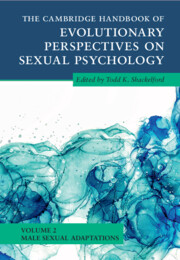Book contents
- The Cambridge Handbook of Evolutionary Perspectives on Sexual Psychology
- The Cambridge Handbook of Evolutionary Perspectives on Sexual Psychology
- Copyright page
- Contents
- Contributors
- Preface
- Part I Precopulatory Adaptations
- Part II Copulatory Adaptations
- 8 Sexual Fantasy
- 9 Ejaculation Latency
- 10 Copulatory Thrusting in Males
- 11 Men’s Provisioning of Oral Sex
- 12 Inducing Female Orgasm
- 13 Copulatory Urgency
- Part III Postcopulatory Adaptations
- Index
- References
13 - Copulatory Urgency
from Part II - Copulatory Adaptations
Published online by Cambridge University Press: 30 June 2022
- The Cambridge Handbook of Evolutionary Perspectives on Sexual Psychology
- The Cambridge Handbook of Evolutionary Perspectives on Sexual Psychology
- Copyright page
- Contents
- Contributors
- Preface
- Part I Precopulatory Adaptations
- Part II Copulatory Adaptations
- 8 Sexual Fantasy
- 9 Ejaculation Latency
- 10 Copulatory Thrusting in Males
- 11 Men’s Provisioning of Oral Sex
- 12 Inducing Female Orgasm
- 13 Copulatory Urgency
- Part III Postcopulatory Adaptations
- Index
- References
Summary
Copulatory urgency is produced by a psychological adaptation that evolved to solve the adaptive problem of sexual conflict resulting from the use of conditional mating strategies. Deployment of a long-term mating strategy, in which individuals invest substantially in the formation and maintenance of an enduring, committed relationship with one partner, puts those individuals at risk of loss of that investment (and more) should their long-term partner pursue a conflicting mating strategy. Consequently, people have evolved motivations, such as copulatory urgency, which protect against that loss. As the potential costs of a partner’s use of a conflicting mating strategy are sex-specific, so too are the manifestations of copulatory urgency. Among men, for whom paternity uncertainty, sperm competition, and cuckoldry are of primary evolutionary concern, copulatory urgency is demonstrated in response to increased risk of a partner’s sexual infidelity and results in behaviors that functioned ancestrally to reduce the risk of cuckoldry. Women, on the other hand, are not subject to maternal uncertainty or cuckoldry. However, women are more likely to be reliant on their long-term male partner’s investment of resources into the ongoing relationship, and so are more likely to demonstrate copulatory urgency and associated motivated behaviors when they are at particular risk of loss of that investment and when the loss of that investment would be particularly costly.
- Type
- Chapter
- Information
- Publisher: Cambridge University PressPrint publication year: 2022

